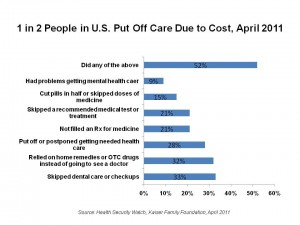 The top 4 personal consumer worries are incomes not keeping up with rising prices; having to pay more for health care and health insurance; not having enough money for retirement; and. not being able to afford health care services we think we need. The April 2011 Kaiser Public Opinion poll from the Kaiser Family Foundation paints a picture of an American populus that’s putting health economic worries at the top of their list of personal concerns. The survey was fielded in March 2011.
The top 4 personal consumer worries are incomes not keeping up with rising prices; having to pay more for health care and health insurance; not having enough money for retirement; and. not being able to afford health care services we think we need. The April 2011 Kaiser Public Opinion poll from the Kaiser Family Foundation paints a picture of an American populus that’s putting health economic worries at the top of their list of personal concerns. The survey was fielded in March 2011.
1 in 2 U.S. adults has skipped some aspect of health care due to cost in the past year. Even 31% of those who earn over $90,000 a year have forgone health care due to cost in the past year, from skipping dental checkups and relying on OTCs and home remedies instead of seeing the doctor, to putting off needed health care.
Rising prices are worrisome for 70% of American adults; paing more for health care and health insurance is top of mind for 69%, roughly the same percentage. Thus, costs for both consumer goods like expensive gas, food, and clothing (note the higher price of cotton today) ranks equal with health personal care costs.
Furthermore, peoples’ confidence in their ability to afford medical care is eroding, particularly in the event of a major illness like a heart attack, cancer, or injury that would require hospitalization. 37% of U.S. adults aren’t confidenct they would have sufficient money to pay for health care in this event.
For about 1 in 2 people covered by health insurance in the U.S., premiums, deductibles and co-pays are going up, KFF’s survey finds. For the other half, these costs are ‘holding steady.”
Health Populi’s Hot Points: Last week, NY Times op-ed writer and Nobel Laureate economist Paul Krugman wrote a well-tweeted column called “Patients Are Not Consumers.” While I am sympathetic to Krugman’s arguments, the KFF poll shows us that “patients” are, indeed, health consumers. However, the data show that health consumers aren’t always well-informed or health literate.
That patients skip doses of medicine, split pills, and don’t fill prescriptions can be, as i frequently write, short-term fiscal ‘rational’ decisions with dreadful longer-term physical risks and potentially adverse medical consequences. Postponing needed care and recommended medical tests — when the care and tests are medically necessary based on current standard practice and protocols — can also be recipes for ill-health.
In case there’s any doubt that U.S workers with health insurance will face increasing costs, a new report from Deloitte, 2011 Top Five Total Rewards Priorities Survey, finds that 71% of employers are concerned about providing health benefits to active employees.




 Interviewed live on BNN Bloomberg (Canada) on the market for GLP-1 drugs for weight loss and their impact on both the health care system and consumer goods and services -- notably, food, nutrition, retail health, gyms, and other sectors.
Interviewed live on BNN Bloomberg (Canada) on the market for GLP-1 drugs for weight loss and their impact on both the health care system and consumer goods and services -- notably, food, nutrition, retail health, gyms, and other sectors. Thank you, Feedspot, for
Thank you, Feedspot, for  As you may know, I have been splitting work- and living-time between the U.S. and the E.U., most recently living in and working from Brussels. In the month of September 2024, I'll be splitting time between London and other parts of the U.K., and Italy where I'll be working with clients on consumer health, self-care and home care focused on food-as-medicine, digital health, business and scenario planning for the future...
As you may know, I have been splitting work- and living-time between the U.S. and the E.U., most recently living in and working from Brussels. In the month of September 2024, I'll be splitting time between London and other parts of the U.K., and Italy where I'll be working with clients on consumer health, self-care and home care focused on food-as-medicine, digital health, business and scenario planning for the future...